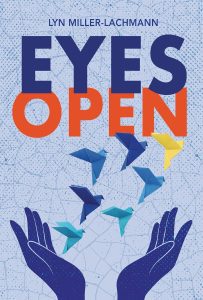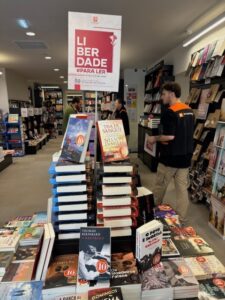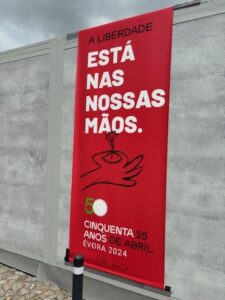A Book Launch in Uncertain Times
 On Tuesday, two days from now, my fourth YA novel and first YA verse novel, Eyes Open, will launch. Although it’s set in Portugal in 1967, I feel that Eyes Open is even more relevant today, with the rise of authoritarian movements in the United States and around the world — the kind of right-wing authoritarianism depicted the novel. My protagonist, Sónia, is coming of age in a society in which women had no power or rights. They could not vote, own property, or even travel out of the country without permission of a father or husband. Women had no reproductive rights, and as a result, many died during pregnancy or in childbirth. A child born out of wedlock was stigmatized for life, denied educational and employment possibilities. In fact, entire families were punished for one member’s misdeeds — either moral failings or dissent against the regime. Women could not flee abusive husbands, and the widespread poverty, inequality, and stress of living under dictatorship contributed to domestic abuse. Husbands beaten down in the workplace took out their frustration on wives and children.
On Tuesday, two days from now, my fourth YA novel and first YA verse novel, Eyes Open, will launch. Although it’s set in Portugal in 1967, I feel that Eyes Open is even more relevant today, with the rise of authoritarian movements in the United States and around the world — the kind of right-wing authoritarianism depicted the novel. My protagonist, Sónia, is coming of age in a society in which women had no power or rights. They could not vote, own property, or even travel out of the country without permission of a father or husband. Women had no reproductive rights, and as a result, many died during pregnancy or in childbirth. A child born out of wedlock was stigmatized for life, denied educational and employment possibilities. In fact, entire families were punished for one member’s misdeeds — either moral failings or dissent against the regime. Women could not flee abusive husbands, and the widespread poverty, inequality, and stress of living under dictatorship contributed to domestic abuse. Husbands beaten down in the workplace took out their frustration on wives and children.
In the case of Sónia’s father, that frustration stems in large part from having five daughters and no sons — no one to whom he can pass down any property or position, and plenty of worries about policing his daughters’ behavior. And with freethinking, free-verse-writing Sónia, he has ample reason to worry.
I recently returned from three weeks in Portugal, where I joined celebrations of the 50th anniversary of the Carnation Revolution that ended this dictatorship. All over the country were exhibits of life before and after the revolution. The public library in Braga, near Portugal’s northern border with Spain, highlighted changes in the status of women since the end of the dictatorship — 26 bullet points that included the right to vote, the right to travel freely, the right to own property, the right to a bank account, the right to sign contracts, the right to sue for divorce, the right to custody of children after a divorce, the right to contraception, the right to terminate a pregnancy, and freedom from investigation by authorities if a pregnancy ended in miscarriage.
The library in Braga also featured an exhibit of books banned during the dictatorship. I spent a lot of time on this exhibit because of the rise of book banning in the United States. In Portugal under the dictatorship, all media — books, newspapers and magazines, music, films, and television broadcasts — had to be submitted to censors in advance. In an upcoming post, I’ll talk about the books and why they were censored, and I appreciated the library’s efforts to highlight the freedom to read as a key achievement of the revolution.
A couple of months ago I wrote a blog post about the termination of the Golden Visa program in Portugal and other countries in Europe. That post has gone viral. While I was in Portugal, I met several people from the U.S. who’d chosen to live in Portugal because of better and more affordable health care as well as safety from gun violence and rising authoritarianism. They came through other visa programs, which I will cover in a future post. I’m also seeing people on social media talking about immigrating to Portugal.
When I hear people from the U.S. choosing to live in Portugal because of its freedoms and social benefits, the first thing I think is that those freedoms and social benefits didn’t just drop from the sky. The people of the country earned them through years of struggle and sacrifice, just as the U.S. earned its independence from the British king in the years before and during a war that lasted from 1775 to 1781. Many made the ultimate sacrifice — their lives. In Eyes Open, Sónia and her boyfriend Zé Miguel pay very high prices for pursuing their dreams and speaking out in the face of government repression.
I ask those who read Eyes Open: Would you pay the same price?
Right now, we in the United States do not have to pay that price. We only have to listen to what the candidates are saying and vote accordingly. Vote for someone who does not talk about bringing forth an authoritarian regime similar to Portugal under Salazar, Spain under Franco, or Italy under Mussolini — or today, Hungary under Orban or Russia under Putin. Vote for someone in local elections who cherishes public schools and libraries and respects the freedom to read. Democracies where people want to live — where people are researching visa programs — are hard-won. And as we’re seeing today, too easily thrown away unless we pay attention and work to maintain them.











Muy bien explicado. Y yo agregaría, vote por un candidato que no promueva el racismo, la xenofobia y la violencia. “Entre los individuos como en las naciones, el respeto al derecho ajeno es la paz”